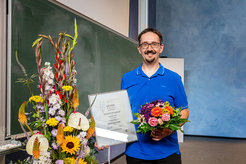Golm scientist receives Jeff Schell Prize for breakthrough in genetic modification of mitochondria
This year, the Max Planck Institute of Molecular Plant Physiology in Potsdam honours again a young scientist for his pioneering research on plant mitochondria.
The Max Planck Institute for Molecular Plant Physiology honours Dr. Joachim Forner for his outstanding research work with the Jeff Schell Prize. At a ceremony on June 29, 2022, the prize, endowed with 2.500 €, was presented to the awardee.

Joachim Forner receives award for his work on the targeted genetic modification of plant mitochondria
The modification of genetic material in living organisms is the basis of modern molecular biology. Plants contain genetic information in three separate genomes in their cells: in the nucleus, in the chloroplasts and in the mitochondria. In the model plant tobacco, methods for genetic manipulation have been available for the nuclear and chloroplast genome for many years. Thanks to these tools, significant scientific results have been achieved that have permanently changed our understanding of plants and the molecular processes taking place within them. Now, Dr. Joachim Forner and his colleagues at the Max Planck Institute of Molecular Plant Physiology have succeeded in specifically modifying a gene in the mitochondrial genome.
Joachim Forner and his colleagues used the relatively new method of genome editing to achieve their goal. The best-known representative of this new form of gene modification is CRISPR/Cas9. However, since mitochondria are not accessible to the CRISPR system, the researchers had to resort to another method. Joachim Forner and colleagues used TALENs (transcription activator-like effector nucleases) to create targeted changes in the nad9 gene in the mitochondrial genome of tobacco plants. In their approach, the researchers managed to specifically amplify the altered gene variants, leaving only genetically modified mitochondria. Using this method, called TALEN-GDM (TALEN gene-drive mutagenesis), Joachim Forner succeeded in generating a series of point mutations in the mitochondria of tobacco plants that could be stably inherited into the following generations. Joachim Forner was able to publish the results of his work in the renowned journal Nature Plants.
"From my point of view, the new possibilities for specific modification of the mitochondrial genomes in plants are a real breakthrough for basic research," says Joachim Forner. The newly developed method is "additionally a sudden expansion of the potential to make crops more productive with the help of hybrid seeds."
In the future, TALEN-GDM will make it possible to specifically modify and study any genes in the mitochondrial genome. The availability of methods for gene modification in all three genomes in tobacco plants opens up new approaches to the study of fundamental molecular processes. Joachim Forner has made a significant contribution to the understanding of molecular biology in plants and beyond and is thus a worthy recipient of the Jeff Schell Prize.
Early focus on Mitochondria
Joachim Forner studied biology at Ulm University. Already during his PhD, he was interested in mitochondrial research which led to him receiving the PhD award for his thesis entitled "Analysis of mRNA termini in mitochondria of Arabidopsis thaliana." After two postdoctoral stays at the MPI for Developmental Biology (now MPI for Biology) in Tübingen and the Ruprecht Karl University of Heidelberg, Joachim Forner came to the Max Planck Institute of Molecular Plant Physiology in Potsdam-Golm in September 2015 to return to the topic of mitochondrial research. He set out to transform plant mitochondria and his scientific work has brought him a significant step closer to this goal.
"For me, the award is a sign of recognition that it was worth it for everyone involved in the project not to be discouraged by the initial hard times," says Joachim Forner. "After all, it took three years to achieve the first breakthrough and another two until we had optimized everything far enough."
Starting in summer 2022, Joachim Forner will take up a new position as interim professor at Ulm University. The Max Planck Institute of Molecular Plant Physiology congratulates him on this new assignment and on being awarded the Jeff Schell Prize 2022.
The award was made possible by a generous donation from BASF.
Jeff Schell, the eponym of the award, revolutionized plant research
The award is named after the Belgian molecular biologist Jozef Stefaan (Jeff) Schell (1935 - 2003). He studied zoology and microbiology at Ghent University, where he worked as a professor from 1967 to 1995. From 1978 to 2000, he was director and head of the department "Molecular Basis of Plant Breeding" at the Max Planck Institute for Plant Breeding Research in Cologne.
Schell was one of the pioneers of biotechnology. As a microbiologist, he was interested in the interactions between plants and soil bacteria. His studies on the formation and development of plant tumors showed that Agrobacterium tumefaciens, which is widespread in the soil, can transfer genes to plants. Subsequently, these research findings led to the possibility of using this bacterium to introduce targeted genes into plants.
The process of transforming plants has since revolutionized plant research, as it can be used to determine the function of genes, enabling plant researchers worldwide to better understand metabolic processes, plant growth and plant development.
